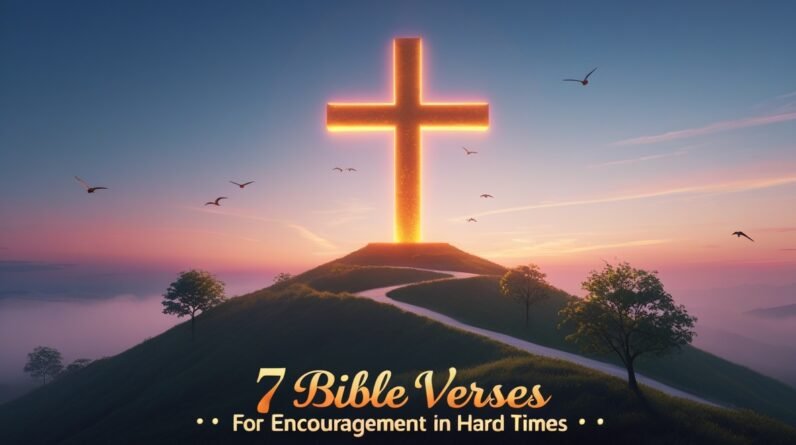Psalm 32:8 — God’s Guidance In Every Step
You come to the page because you want an anchor, because choices keep piling up, and you’re tired of pretending that either randomness or sheer willpower will be enough. There’s a sentence in the Bible that people reach for in those moments. It’s short and plain and oddly intimate: “I will instruct you and teach you the way you should go; I will counsel you with my eye upon you.” That is Psalm 32:8, and in what follows you’ll be invited to think about how that promise might actually meet you — not as a slogan but as a practice you can trust in the small, thickly ordinary texture of your days.
What Psalm 32:8 Says About Guidance
You might know the verse by heart or have never read it; either way, it rewards being read again slowly. Psalm 32 has a confessional warmth — the speaker knows guilt and relief, error and forgiveness — and in that atmosphere this instruction feels more like a friend leaning over a map than a distant decree. Psalm 32:8 offers both instruction and companionship: God promises to teach and to keep watch with counsel like an attentive presence. It’s a different kind of guidance than commands; it’s relational, practical, and present.
The Verse and Its Immediate Context
You’ll want to read the whole psalm, because context matters. In Psalm 32, the speaker moves from confession to forgiveness and then to instruction. The promise in Psalm 32:8 follows the relief of being forgiven. That sequence is important: guidance is not promised to perfect people who never err, but to those who know their need for counsel. Read it on Bible Gateway and notice how intimacy and instruction are woven together in a single line.
Why Guidance Matters in Decision Making
Decision-making feels like a kind of loneliness. You sit at a table with the options spread out like cards, and no matter how many people you consult, you still have to make the call. That’s where the promise of guidance becomes meaningful: it transforms your posture toward choices. When you believe there is instruction available — not as a magic formula but as a steady companion — you can stop trying to manufacture certainty and instead learn to listen. The phrase “Psalm 32:8 decision making” indexes a way of framing your choices so they’re not just guesses; they can be moments of discernment lived with attention.
The Role of Providence and Participation
You’ll often hear two inaccurate caricatures of divine guidance. One is that God micromanages every tiny choice and makes it obvious which fork to take. The other is that God is totally hands-off, and you are utterly alone. Psalm 32:8 invites a middle course: a providence that provides instruction and a calling for you to respond. This is not passivity; it’s participation. You are not waiting for a neon sign, but you are not abandoned either. Think of it as a tutor who points, explains, and waits for you to try the problem yourself.
How to Hear God’s Guidance
If you want practical ways to make room for that instruction, begin where you are. You can make small rituals: a breath, a pause, a question framed honestly — “What would you have me notice here?” — and then listen. Guidance often arrives not as a command but as clarity: one option will settle the way a good pair of shoes settles your feet. It may come through Scripture, through another person’s wise word, through a sudden change of appetite for something, or simply in the removal of options that were never viable. These textures of discernment are not dramatic but reliable.
Prayer and Silence
Prayer matters because it’s the habit of turning toward that promised instructor. But prayer isn’t only pleading; it’s listening. You might feel awkward about silence. You’re used to filling the room — scrolling, rehearsing arguments in your head, making lists. Try trimming away the noise for a few minutes a day. Silence trains you in attention, and [Psalm 32:8 decision making] becomes an experiment: you name a decision, you trust to wait, and you notice what arises. Those quiet minutes aren’t dramatic, but they matter. If you want to compare notes, read Proverbs 3:5–6; it’s another voice in the same tradition, nudging you toward trust and acknowledgement.

Scripture and the Spirit
Reading the Bible can be an instrument of guidance. When a passage intersects with your situation unexpectedly, that intersection may be an occasion of counsel. You’ll want to read widely, not cherry-pick for confirmation. Scripture is a conversation partner, not a vending machine. The Holy Spirit’s role in many Christian traditions is precisely to guide and to remind; see John 14:26, where Jesus promises an Advocate who teaches and recalls. This is not a guarantee that every personal whim will be answered miraculously, but it is an offer that your discernment can be formed by scripture and sustained by the Spirit.
Trusting the Process Even When It’s Messy
You’re allowed to be messy. Discernment isn’t a straight line. You might make a decision that later looks wrong; you might change course and find consolation in the fact that movement itself refines you. James 1:5 recommends asking for wisdom, and that asking doesn’t stop the hard work of learning. The promise in Psalm 32:8 is not that you’ll bypass pain, but that you’ll have instruction through it. The counsel might be persistent and patient, and much of your work is simply to keep showing up.
Practical Steps for Applying Psalm 32:8 to Your Life
You can shape discernment into habits you practice. Start small: before big and small choices, take a breath and name the desire behind each option. Write the pros and cons, but also note how each choice resonates in your body. Ask a friend to pray with you or to read a passage of Scripture with you. Journal the outcomes. Over time, you’ll learn which voices in your life are clarifying and which are noisy. Consistent practices help the promise in [Psalm 32:8 decision making] decision-making feel less theoretical and more like a daily technique.
Daily Practices That Tune Your Ear
Daily practices ground you. You can mark the day with a short liturgy: gratitude, one honest confession, a question you’re holding. Read Psalm 119:105 — “Your word is a lamp to my feet and a light to my path” — and consider how that image fits your life. The lamp doesn’t show the whole road at once, but it reveals the next step. That’s how many people experience guidance: incremental, steady, shaping your next choice rather than ordering an entire life.
Decision-Making Framework
You don’t need a complicated algorithm. Try this simple four-part framework when a decision presses on you:
- Name the decision honestly and state why it matters to you.
- Pray or sit in silence and ask for instruction, then read a related Scripture passage.
- Seek counsel from someone you trust and who loves you well.
- Act on the clearest next step, and treat it as provisional — you can pivot.
This isn’t a guarantee board. It’s a way of letting [Psalm 32:8 decision-making] decision-making become embodied practice. The aim is not perfect outcomes; it’s faithful orientation.
Common Misconceptions About Divine Guidance
You’ll hear people say all sorts of things about hearing God. Some promise a thunderclap every time you do something right. Others equate guidance with immediate success. Both are distortions. Guidance is often quieter than your expectations. It might be a steady sense that one option aligns with your core convictions, rather than a magical sign that erases all uncertainty. Isaiah 30:21 frames guidance as a voice that will tell you what to do — but note the context: that voice is experienced by a people learning to attend, not by someone who has never practiced listening.
Mistaking Anxiety for Direction
Anxiety masquerades as counsel. It will give you many reasons to act now. Learning to distinguish anxiety from guidance is part of the practice. A simple test: does the impulse to act narrow your perspective or open it? Does it come with a sense of spaciousness or with sharp, panicked pressure? Guidance tends to steady; anxiety tends to contract. When you cultivate silence and prayer, you’ll start to notice these differences more reliably.
Expecting an Audible Voice
You might be waiting for a literal voice. Many modern readers dismiss guidance unless it speaks as clearly as a text message. But biblical guidance often comes through other means: wise counsel, the clarity of Scripture, a neighbor’s practical help. See Proverbs 11:14 — “Where there is no guidance, a people falls, but in an abundance of counselors there is safety.” Guidance is distributed among people and texts, and practices. Don’t limit your expectation to theatrics; the divine often uses ordinary channels.
Stories That Illustrate Guidance
You’ll notice guidance tends to look straightforward in hindsight and messy in real time. Think of a friend who turned down a job on the basis of a thoughtless but persistent unease and later found a position that fit unexpectedly well. Or consider someone who married quickly and learned everything slowly, but who had consistent, small promptings to be honest and patient. These stories aren’t proof texts; they’re patterns. They show that instruction may be tactile — a nudge to speak, to wait, to remain. When you place your life beside [Psalm 32:8 decision making], those patterns start to orient your choices toward fidelity rather than novelty.
When Guidance Seems to Fail
You will sometimes think you heard and discover you were wrong. This hurts, and it’s normal. Theologically, guidance does not override human freedom and consequence. Choosing is risky; sometimes the counsel you hear is mixed or misapplied. When this happens, respond with honesty. Confess what happened, learn what the mistake teaches, and remember that Psalm 32:8 is embedded in a psalm of forgiveness and restoration. The promise continues; it does not abandon you because of an error.
How Community Helps Discernment
You’re not meant to be a spiritual island. The Bible repeatedly places discernment in the context of community. Proverbs 15:22 says, “Plans fail for lack of counsel, but with many advisers they succeed.” Trusted companions help you see blind spots. They reflect back whether your sense of being guided seems grounded or flighty. Invite people who love truth and who love you well to be part of the process. This is how [Psalm 32:8 decision making] moves from private sentiment to shared wisdom.
The Role of Emotion and Reason
You will want to know whether feeling strongly about something is spiritual evidence. Emotions are data, not dictators. They tell you what’s alive in you — fear, hope, grief — and they deserve attention. Reason helps you test impulses, weigh consequences, and imagine timelines. The healthiest decisions usually integrate heart and mind. The promise in Psalm 32:8 invites you to knit feeling and reason with prayer and scripture until your next step is both intelligible and humane.
Holding the Future Lightly
One of the gentler consequences of trusting guidance is a kind of looseness with outcomes. If you truly believe you are being instructed, you can treat your plans as tentative and your attachments as flexible. This doesn’t mean you don’t care about results; it means you resist idolizing them. Matthew 6:34 — “Do not worry about tomorrow” — pairs oddly well with [Psalm 32:8 decision making], because both encourage attention to the present assignment without being frantic about the distant horizon. You practice fidelity to today and leave room for correction.
What to Do in Big, Life-Defining Moments
When choices feel epochal — marriage, career, migration — you will want to double your practices. Take longer silences, seek multiple trusted voices, and allow time for your body to settle into an option. Big decisions are not usually best made in a week. Many people discover that waiting clarifies whether an initial excitement is durable. Use Scripture as a steadying friend: James 1:5 encourages asking for wisdom; Proverbs 3:5-6 reminds you to trust and acknowledge God in your ways. These texts are not formulas; they’re companions for the long haul.

The Ethics of Decision Making with Guidance
You’ll want your decisions to be moral, not merely convenient. Guidance that comes to you personally will also have implications for other people. Testing your choices against love and justice is essential. Ask not only “What do I want?” but “Who will this affect?” and “Will this harm or liberate?” Scripture repeatedly links right choices to concern for the vulnerable. Micah 6:8 — “do justly, love mercy, walk humbly” — is a compact test. God’s instruction in [Psalm 32:8 decision making] is not just about personal flourishing; it aims at communal flourishing.
When You Don’t Feel Anything
Sometimes nothing seems to happen. You sit in silence and feel blank, empty, or distracted. That’s a common experience and not necessarily a sign of spiritual dryness. You might be tired, emotionally taxed, or simply resistant to what’s real. When that’s the case, begin with small, faithful acts: keep showing up at work, tell the truth, choose care. Often, guidance reveals itself through sustained small acts rather than dramatic revelations. The practice of faithful presence itself trains you to notice when a pathway lights up.
How the Church Shapes Discernment
If you’re part of a church, it’s a resource for guidance. Liturgy, sacraments, preaching, and pastoral counsel are disciplined ways of listening to God together. The community can hold your decisions in prayer and offer corrective love. You’ll want to be careful about uniformity; church guidance should not crush individual conscience, but it should help calibrate your discernment. Many Christian traditions emphasize communal discernment because human beings are conversational animals. Acts 15 models a council that prayed, argued, and sought wisdom together.
The Long View: Formation Over Time
You will not become fluent in discernment overnight. Virtue forms slowly. The next decision you face will be easier if you have a pattern of turning toward God in smaller choices. Over time, you develop a grammar of listening: you recognize certain textures as clear or muddled, you notice when advice aligns with your character, and you learn to be gentle with mistakes. That’s what [Psalm 32:8 decision making] is about in the long run: the formation of a people who know how to move with attentiveness.
Doubt and Faith in Tandem
Doubt isn’t the opposite of faith; it’s often its companion. You may doubt whether you heard rightly or whether guidance exists, and that doubt can be useful. It can prevent you from idolizing your initial impressions, and it can make you kinder to others who are uncertain. Faith, in this framework, is the persistent choice to show up for discernment despite doubt. The promise of Psalm 32:8 becomes more plausible when you accept that you will wobble and that wobble does not disqualify you from being guided.
Final Thoughts: Living with an Instructor
You want a life where decisions are not tyrannized by fear or treated as mere transactions. The invitation of [Psalm 32:8 decision making] is to live in a posture of disciplined listening, to let guidance shape your routine, your conversations, and your imagination. It’s not about achieving perfect clarity but about inhabiting a relationship in which counsel is offered and received. Over time, that relationship will rearrange how you choose, not by removing difficulty but by offering a steady presence through it.
You can read the key verses I referred to here at these links: Psalm 32:8, Psalm 32, Proverbs 3:5-6, John 14:26, James 1:5, Psalm 119:105, Isaiah 30:21, Proverbs 11:14, Proverbs 15:22, Micah 6:8, and Acts 15.
Explore More
For further reading and encouragement, check out these posts:
👉 7 Bible Verses About Faith in Hard Times
👉 Job’s Faith: What We Can Learn From His Trials
👉 How To Trust God When Everything Falls Apart
👉 Why God Allows Suffering – A Biblical Perspective
👉 Faith Over Fear: How To Stand Strong In Uncertain Seasons
👉 How To Encourage Someone Struggling With Their Faith
👉 5 Prayers for Strength When You’re Feeling Weak

📘 Jesus and the Woman Caught in Adultery – Grace and Mercy Over Judgement
A powerful retelling of John 8:1-11. This book brings to life the depth of forgiveness, mercy, and God’s unwavering love.
👉 Check it now on Amazon
As a ClickBank Affiliate, I earn from qualifying purchases.
Acknowledgment: All Bible verses referenced in this article were accessed via Bible Gateway (or Bible Hub).
“Want to explore more? Check out our latest post on Why Jesus? and discover the life-changing truth of the Gospel!”








